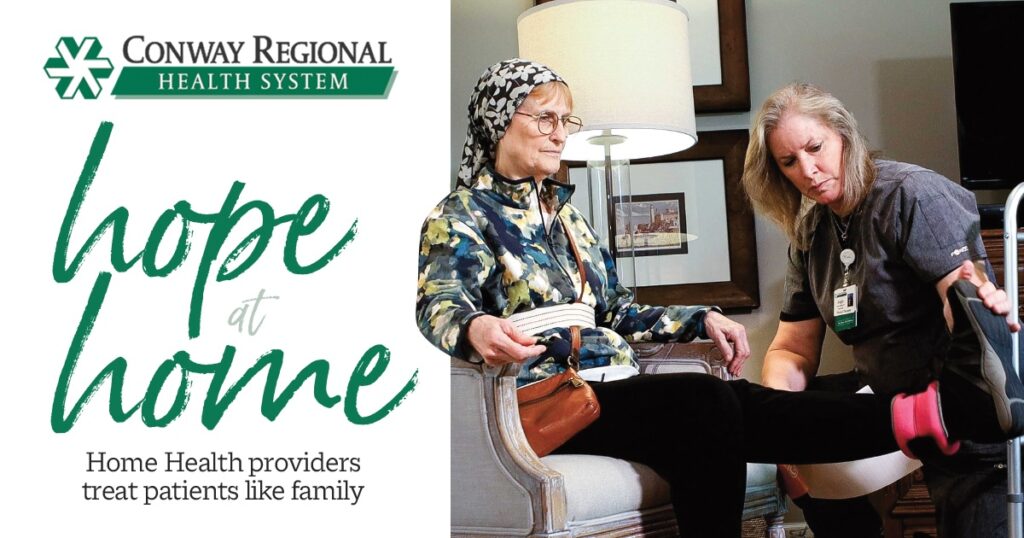03 Feb 2024 Home Health providers treat patients like family
When facing healthcare challenges, maintaining your health can be a challenge, especially for the elderly or those living alone or in a poor economic situation. In those instances, they need a home health provider who treats them like family.
Angie Smithson, a physical therapist with more than 35 years of experience, is one of those home health providers. Angie cares deeply for her patients and sets an example for the team of therapists and nurses with Conway Regional Home Health. While her therapy duties are important for the patient’s recovery, sometimes they need something extra.
“You want to be a light in people’s darkest times, when they feel hopeless and believe that no one cares,” said Smithson, who believes that home health is her calling. “I feel like I’ve been placed here for a reason. I’ve been put in a position to identify their needs, and I’m one of many providers trying to help them.”

The depth of her caring was revealed when she went to great lengths to ensure that one of her patients had access to an electric wheelchair. The wheelchair was necessary for the patient to attend his doctor’s appointments. Smithson drove to her home and used her own trailer to retrieve an unused wheelchair from Damascus and then delivered it to the patient’s home in Greenbrier. She also trimmed his hair and the hair of his son with special needs so they would not have to try to attend an appointment in a salon.
The patient said that he had never had anyone care so much about his needs and his son’s needs. “She truly invests in her patients’ well-being and helps in any way she can,” an anonymous coworker of Smithson said. “Not just with physical mobility, but with their emotional support and sometimes even helps raise funds for their financial needs.”
Sindee Morse, director of Home Health, praised Smithson’s actions as an example of how her staff goes above and beyond to help their patients stay healthy and avoid hospital stays.
The focus on keeping senior adults and other patients with chronic illnesses living at home is shifting toward removing social barriers to health. Do patients have adequate housing? Can they pay for their medicine, food or utility bills, and do they have the necessary education to stay healthy? According to Morse, these are a few of the questions that must be answered by those providing home health.
Home health providers do more than their standard duties of taking vital signs, providing in-home therapy and helping with medication management. Conway Regional Home Health providers are overcoming social roadblocks to good health, such as:
• Working to ensure their patients’ nutritional needs are met, and if not, assisting them with getting to food banks, registering for Meals on Wheels, or working with area churches to assist in providing meals.
• Reaching out to a volunteer carpenter or a church group to build a wheelchair ramp or fix a flooring hazard in a patient’s home.
• Making calls to a pharmaceutical company to get discount coupons for medicine.
• Assisting patients in qualifying for community services that help with equipment, transportation and caregiver resources.
• Reducing fall risks in the patient’s home, even if that means melting ice or shoveling snow or ice from ramps or stairs.
Without this type of support, home health patients are at risk for a relapse of the medical condition that forced them to go to the hospital in the beginning. They are also at risk of falls, malnutrition and many other health issues.
“A routine, one-hour patient visit can easily turn into three hours or longer depending on the patient’s situation,” Morse said.
The Conway Regional Home Health staff made 17,645 visits in 2023, and many of their patients were senior adults and disadvantaged younger people living in poor conditions.
“The impact our home health program provides is subtle, humbling and at times goes unnoticed,” Morse said. “Our clinicians spend hours of their own time trying to find additional resources for patients who are living in poor conditions and are sick, unsafe, hungry and without family support at home.”
Smithson also believes that home health providers add another significant patient benefit. “Sometimes all people need to know is that there is hope, and there are people who want to pay things forward.”









